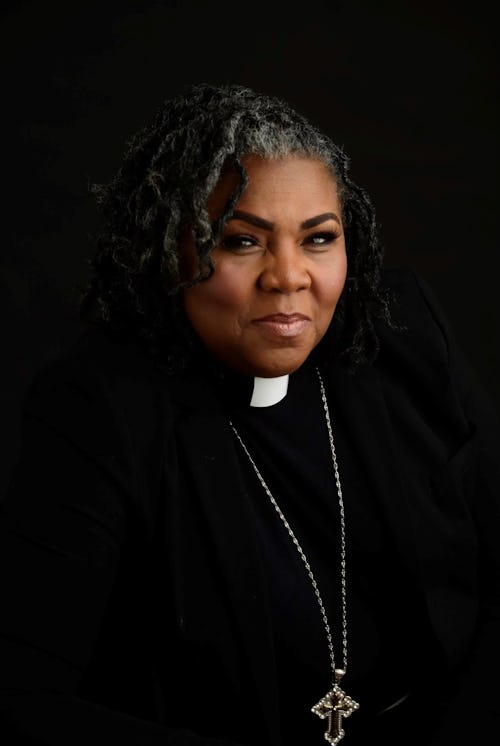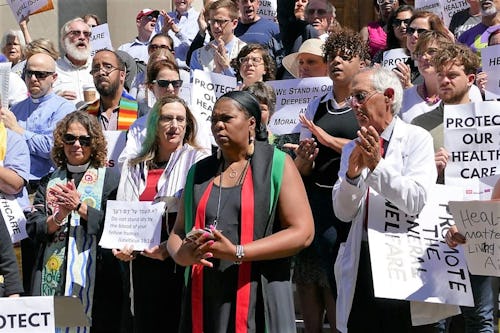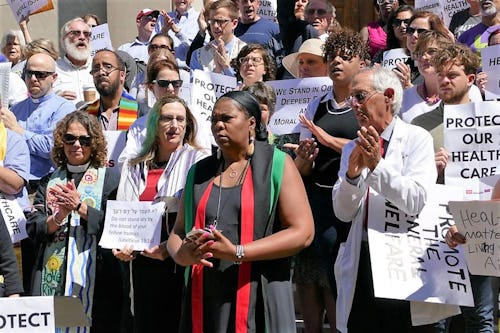
Growing up, the Reverend Traci Blackmon was taught that abortion was murder. Everyone in her life, including her Baptist pastor grandfather, would have said so. Then, when she was 16, she got pregnant. “[I was] too young to be engaged in sex and definitely too young to be a parent,” she tells Mic, so, “I chose to have an abortion.” Blackmon’s family, who firmly believed abortion to be a sin, supported her.
“What we profess and what we live don't always add up,” Blackmon, now a nurse and an ordained minister in the United Church of Christ (UCC), says. “You don't know where you really stand until it’s personal.” Blackmon doesn’t believe she should have to tell her personal abortion story. But today, with abortion rights in the U.S. hanging by a thread, she’s telling it for the first time.
With many evangelicals celebrating the end of Roe v. Wade — and Catholic bishops even denying Communion to House Speaker Nancy Pelosi over her support of abortion rights — it’s easy to believe Christianity is inherently anti-abortion.
But Blackmon, an abortion rights advocate who serves as the UCC’s Associate General Minister of Justice and Local Church Ministries, says it’s critical to disentangle these ideas. In fact, her own denomination has been involved in abortion rights advocacy for decades; before the 1973 Supreme Court ruling recognized the right to abortion, UCC ministers were part of a clergy network connecting women to doctors willing to provide abortions based on their own understandings of Christianity. “I think the laziness of some Christianity has caused people with louder voices and more political presence to be able to draw a narrative that other Christian voices have to speak out against, so that people can think about this,” she says.
Blackmon spoke with Mic about anti-abortion Christian hypocrisy, how her personal beliefs on abortion have evolved, and what she wants Christians seeking abortions to know.
Was it this lived experience that made you start questioning the anti-abortion views you had been taught?
No, actually. I left that experience thinking I had done something horribly wrong, but that I had to do it to save myself and this child I had no business trying to raise. I didn't change my views at that time. I lived with a lot of guilt.
When I served on Planned Parenthood’s board as a clergy member, part of our training was about how occasionally, inside the clinic, we might see the same people who would be outside protesting abortion. We would treat them with the same grace and respect for privacy as we do everyone else. If we saw them outside again the next week, we couldn’t talk about that. Even if they say they're against something, sometimes people make these life-or-death decisions.
“What we profess and what we live don't always add up.”
How did you come to start advocating for abortion rights?
The reason I came to fight for abortion rights is because it was my choice to make.
I don't understand human life, soul life, as separate from God's breath. I don't consider every living organism to be a baby. That's my personal, evolved thinking about it. But however I wrestled with it internally, those who cared for me, those who knew that I wasn’t ready for that, those who knew it wasn’t intentional and in some ways not even voluntary that I found myself pregnant — those people protected my right to choose.
How do you see abortion rights as consistent with Christian ethics and theology?
The right to choose is part of our God-given inalienable rights. As a Christian, the creation story says it’s the right of every human being to have choice — that God gave us choice. God doesn't even mandate worship. God doesn't even mandate obedience to God. Human beings should have the right to make these decisions for themselves, and women should not have to jeopardize their lives because they make such a decision. And we know there is no Supreme Court decision or state law that's going to stop abortions. They will only impact safe abortions.
We don't have to agree about how you feel about abortion. For me, this is about the rights of humans to decide how they want to live and show up in this world.
In my sacred texts, in my Biblical understanding, when God created humankind, it was the only creation that God breathed into — which is the moment of life — and it's the only creation that God gave choice. Fish swim because God said fish swim. Birds fly because God said birds fly. It was only with humans that God said: I'm putting all this stuff in this garden, and you learn to take care of yourself, you learn to be fruitful and multiply, you tend the garden, and there's this one place in this garden I don't want you to go. Now, this was God. God could have not put the tree in the garden, or made fire come out of the tree if you got too close.
So choice is inherent in my faith. It is my body. God gave it to me. It's not up for vote, it’s not up for consensus, it’s not for other people to act upon it. I'm responsible for it. And if you believe what I'm doing is wrong, you get to believe that. But you don't get to place your beliefs on my life, on my body. It boils down to that.

How do you see and respond to Christian arguments against abortion?
The argument I hear most often is that a fetus is a life, and that life deserves to be protected, that the fetus can't protect itself and so society must protect that fetus. I can hear that argument. My issue is that this commitment and passion to life doesn't extend beyond the womb.
You can’t be pro-war, and pro-death penalty, and anti-healthcare, but also be anti-abortion on the theological grounds that life must be preserved at at all costs. So it's okay that we go somewhere else in the world and kill people because they're not in the womb? It's hypocritical for me. And if you’re so concerned about the children who aren’t being born, then provide for them when they are born. You want to govern someone's body to carry a fetus until you have a baby, but you won’t put any safety nets in place for that baby once it’s born? Be consistent. This is not about pro-life unless you're concerned about the living as well, and that's not the case.
It’s smoke and mirrors that this is about the life of a child. It is the juxtaposition of theology and politics: We are theologizing our politics, and we have politicized our theology. The conservative arms pushing anti-abortion legislation are not doing so for the lives of children, they're doing so for the control of the people. Scripture does not make a case for this.
“It’s smoke and mirrors that this is about the life of a child.”
You’re saying Jesus had nothing to say about abortion?
No, Jesus didn’t say anything about abortion. But Jesus had a lot to say about love. And Jesus also never had anything to say about making people do what I want them to do. Neither did God. God said: This is morally right and that is morally wrong, you choose. And even if you choose wrong, I'm still going to love you.
Many American Christian traditions, like your own denomination, hold that abortion is consistent with their faith. Why is this important to recognize?
A lot of this is happening in Christianity because of biblical illiteracy and theological malpractice. You don’t have to think hard to see the hypocrisy. The same pulpits that say you can’t kill an unborn child are the same pulpits that say you have to go to war.
Christian scripture doesn't say anything explicitly on abortion either way. But even if that were the Christian standpoint, we shouldn’t be legislating our faith. Not everyone in America is Christian. Faith is a personal choice.
As a pastor, how do you counsel Christians who come to you for help in making a decision about abortion?
I've had to counsel people who have been violently raped, people who have become pregnant by incest. I never tell people what to do. I give them my best medical information about what's involved in both. I listen with a compassionate ear and try to be a loving spirit. It is my responsibility to accompany them in the places they choose to go. If they've chosen abortion and want me to go with them, I go. If they choose to have a child, I stand with them in that.
And if they asked me, “What will God think of me? Will God love me?”, then I remind them that God's love transcends this world and any individual decision. That's what I believe.








